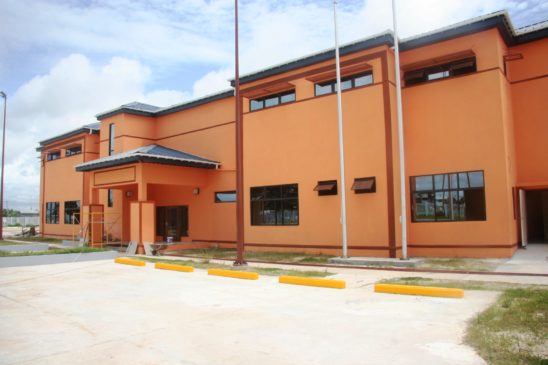
Close to five years after it officially opened its doors, the Guyana Forensic Science Laboratory (GFSL) is now able to conduct critical tests that will aid in the fight against crime.
On Wednesday, the spanking new equipment funded by the Inter-American Development Bank (IDB) was commissioned at the lab which is housed at Turkeyen, Greater Georgetown.
Director of the G$1.049B building Delon France listed the newly added features.
“The laboratory is now a national pioneer for human identification using Deoxyribonucleic Acid (DNA) testing and it enables us to conduct three main things: DNA testing for comparison or matching evidence to a suspect, paternity testing, family mapping or family testing where you can use the family DNA to identify a suspect even if we don’t have that particular suspect’s DNA. We can match a crime scene to a family member and then we can narrow it down through investigation of who actually committed the crime,” he explained.
The Director noted that these tests can be conducted using samples from the human cheeks, semen and vagina, hair, blood and most importantly, finger prints or touch.
When the building was first commissioned it had four departments including toxicology, documents, trace evidence and chemistry with six non-analytical departments namely security, quality system, information system, facilities operations, evidence and administration departments.
Following its launch, however, the GFSL opened two other departments, namely the Forensic Radio Evidence and the DNA aspect which was commissioned Wednesday.
Acknowledging that the wait for such services was indeed a lengthy one, the Director informed that four persons are being trained to use the long awaited equipment. In addition, a number of training sessions are also on schedule for crime scene personnel of the Guyana Police Force (GPF).
Important to note, is that plans are afoot to establish a national DNA database.
“With future expansion in mind, there are plans to establish a national DNA database that would require legal intervention and amendments to Chapters of the Laws of Guyana, especially the Police Act Chapter 16:01 Section 35 which should include DNA records to facilitate this venture,” France pointed out.
Meanwhile, a smiling Public Security Minister, Khemraj Ramjattan, said the commissioning of such services was good news for the country as he explained how it will aid in crime fighting.
He informed, “The Scanning Electron Microscope will be used for gunshot residue testing, and the presence or absence of this residue can corroborate with misstatements and testimony and provide investigational leads…this forensic equipment is important in crimes involving firearms and the discharge of those firearms”.
While on investigations, he also assured that unresolved crime related matters, including murder, rape or found body parts can now come to a closure with the aid of the new tools.
Along with reducing the time for an investigation, these equipment will also help to cut costs as usually about G$1.5 million is spent on a DNA test. This will be slashed to about G$60,000.
Although the G$1.049B building was opened since July 2014, the forensic laboratory was unequipped with the required tools it needed.



